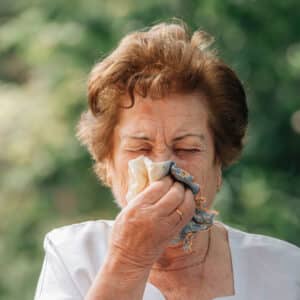 April showers bring May flowers… and a dusting of pollen. While we welcome the arrival of warmer days and sunny skies, many Seniors Helping Seniors® clients face symptoms from springtime allergies. As we age, weakened immune systems or pre-existing health conditions can make older adults more vulnerable to allergies. With the allergy season peaking in April, symptoms like congestion, itchiness, and sneezing often come in full swing. If you’ve been struck by spring fever this year, the Seniors Helping Seniors® team wants to help. In this blog, we’ll review seven senior-focused tips for navigating the allergy season. Keep reading to discover our best advice for enjoying the beauty of spring while minimizing the annoying symptoms of allergies.
April showers bring May flowers… and a dusting of pollen. While we welcome the arrival of warmer days and sunny skies, many Seniors Helping Seniors® clients face symptoms from springtime allergies. As we age, weakened immune systems or pre-existing health conditions can make older adults more vulnerable to allergies. With the allergy season peaking in April, symptoms like congestion, itchiness, and sneezing often come in full swing. If you’ve been struck by spring fever this year, the Seniors Helping Seniors® team wants to help. In this blog, we’ll review seven senior-focused tips for navigating the allergy season. Keep reading to discover our best advice for enjoying the beauty of spring while minimizing the annoying symptoms of allergies.
Springtime Allergy Season
Colorful flowers, lush leaves, and warm sunshine beckon seniors to venture outside and enjoy the natural spring beauty. However, with all the new growth comes an increase in tree, grass, and weed pollen that can lead to itchy eyes and stuffy noses for many people. Spring weather can also be unpredictable, with fluctuations in temperature and precipitation affecting pollen levels and worsening allergy symptoms. The Seniors Helping Seniors® family cares about your well-being this spring, and we encourage you to take necessary precautions to protect yourself from excess pollen exposure.
Many seniors, especially those with pre-existing health conditions such as asthma, chronic obstructive pulmonary disease (COPD), or cardiovascular issues, experience more severe and prolonged allergic reactions. Persistent symptoms may interfere with daily activities, sleep, and overall well-being. The Seniors Helping Seniors® team wants to ensure you enjoy the beautiful weather this spring. Below, you’ll find our best tips for managing seasonal allergies.
Monitor Pollen Levels
Pollen levels can change quite a bit throughout the day, depending on various external factors. But don’t worry! Local weather forecasts and other online references make it easy to keep track of pollen levels. When pollen counts are high, limiting your time outdoors might be a good idea. If you need help accessing digital resources, your friendly and helpful Seniors Helping Seniors® caregiver can lend a hand!
Invest in an Air Purifier
Air purifying devices boost indoor air quality by clearing out airborne particles like pollen. They work wonders in refreshing rooms that often gather contaminants, leaving behind noticeably cleaner and fresher air. Adding one to your home is a simple and effective way to create a healthier environment for you and your loved ones.
Keep Windows Closed
While opening windows can bring in fresh air, it also invites pollen and allergens indoors. If you struggle with severe allergies, keeping cool with AC might be a better choice. And don’t hesitate to ask your Seniors Helping Seniors® caregiver to help you tidy up those pollen-prone spots in your home. They’re here to support you in creating a comfortable and allergen-free environment.
Replace Air Filters in Your Home
It’s important to change the air filters in your home every three months. If it’s been a while since you last replaced them, spring is the perfect time to do so. High-efficiency particulate air (HEPA) filters offer extra protection against pollen and other contaminants. The extra shield helps maintain a healthier indoor environment for you all season long.
Wear Protective Clothing
Just as you’d apply sunblock before spending time under the sun, it’s important to take precautions to minimize pollen exposure during allergy season. Before going outside, put on a wide-brimmed hat, sunglasses, and a pollen mask for added protection. And after enjoying the outdoors, don’t forget to take a shower to wash away any lingering pollen from your skin and hair.
Stay Hydrated
Drinking enough water each day offers numerous health benefits. It not only keeps you hydrated but also helps flush out pollen and other pollutants from your system, easing allergy symptoms such as dry throat and nasal congestion. Don’t forget to carry a reusable water bottle with you — it’s a simple way to stay hydrated and feel your best throughout the day.
Consult a Healthcare Professional
If you’re experiencing severe symptoms that you can’t manage at home, don’t hesitate to contact your doctor. They can prescribe allergy medication to help ease the effects of pollen and other irritants. If you need transportation to your appointment, your Seniors Helping Seniors® caregiver would be more than happy to give you a ride.
Spring brings a sense of renewal and promise with longer days and warmer temperatures. The Seniors Helping Seniors® family understands how vital it is for seniors to embrace this rejuvenating season without the burden of seasonal allergies holding them back. We hope this guide has offered valuable insights to help you navigate and manage pollen exposure this spring. Remember, our compassionate Seniors Helping Seniors® caregivers are here for you, ready to provide the caring support you need to enjoy every moment of this special season.


